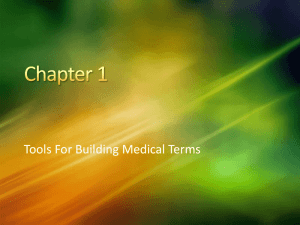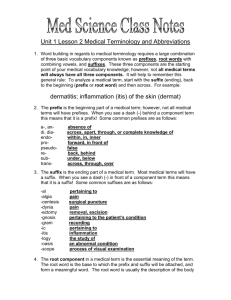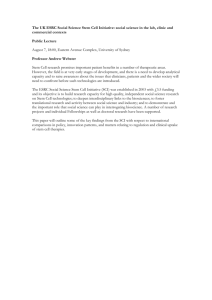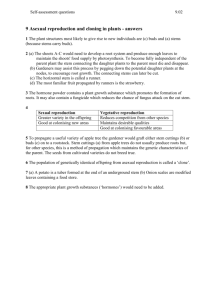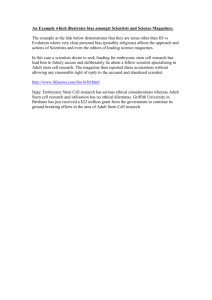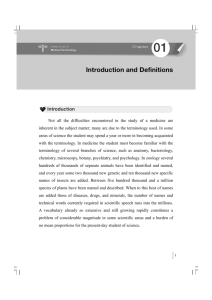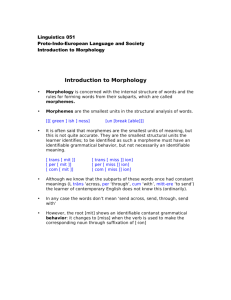Medical Terminology
advertisement
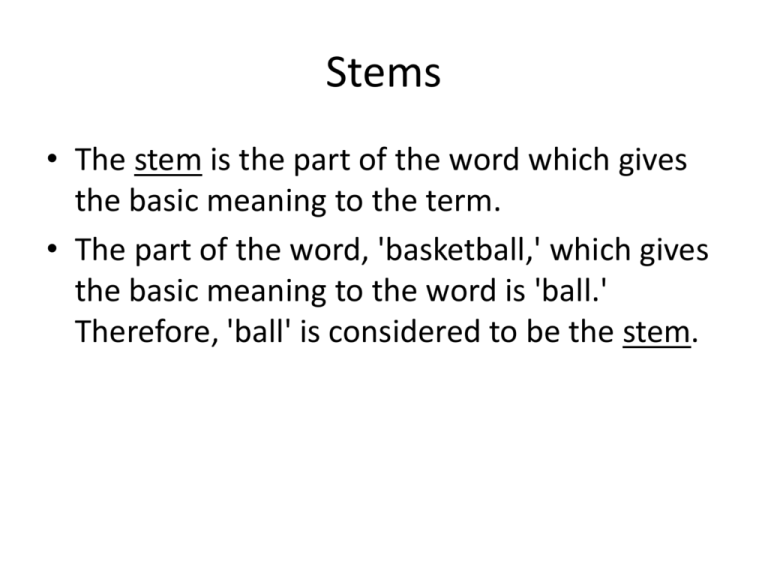
Stems • The stem is the part of the word which gives the basic meaning to the term. • The part of the word, 'basketball,' which gives the basic meaning to the word is 'ball.' Therefore, 'ball' is considered to be the stem. • The part of the word which comes before the stem and modifies or augments the meaning of the stem is called the prefix. • In the word 'basketball,' 'ball' is the stem and 'basket' is the prefix. • The part of the word which comes after the stem and modifies or augments the meaning of the root word is called the suffix. • In the term 'specialist,' 'special' is the stem and 'ist' is the suffix. • All words have a stem. Even everyday words have stems. For example, in the words ‘singer,’ ‘writer,’ and ‘speaker,’ ‘sing,’ ‘write,’ and ‘speak’ are the stems. • In medical terms such as hepatomone, gastrotome, and arthrotome, the hepat (meaning liver), gastr (meaning stomach), and arthr (meaning joint) are the stems. • This awkwardness of pronunciation makes it necessary to insert a vowel called a combining vowel. • Usually the combining vowel is an ‘o,’ but occasionally it may be ‘a,’ ‘e,’ ‘i,’ ‘u,’ or ‘y.’ • We find combining vowels in ordinary words. • Instead of joining the two stems ‘therm’ and ‘meter’ directly, we insert the combining vowel ‘o’ and say ‘therm - 'o' meter.’ • Here are some more examples: – a. Speed - meter becomes speed- ometer. – b. Megal - mania becomes mega- lomania. – c. Strat - phere becomes strato- sphere. – d. Therm - meter becomes ther- mometer. Review • • • • • • • Osteo means: Bone Arthro means: Joint. Chondro means: Cartilage Myelo means: Bone marrow Myo means: Muscle Tendo means: Tendon Costo means: Rib Review • • • • • • • • • Derma means Skin Onycho means Nail Rhino means Nose Naso means Nose Laryngo means Larynx Tracheo means Upper Windpipe or Trachea Broncho means Lower windpipe or Bronchus Pulmo means Lung. Pneumo means Air Review • • • • • • • • Stoma means: Mouth Lingua/glossa means: Tongue Dento/odonto means: Tooth Cheilo means: Lip Gingivo means: Gums Gastro means: Stomach Colo means: Colon Procto/ano means: Rectum or anus Review • Hepato means: Liver • Celio/abdomino means: abdomen • Laparo means: abdominal wall Cardiovascular System • • • • • cardio means: Heart angio/vaso means: Vessel phlebo/veno means: vein arterio means: Artery thrombo means: Clot of Blood Review • • • • • cyto means: Cell hema/hemato means: Blood spleno means: Spleen lympho means: Lymph phago means: To eat Review • • • • • • acro means: Extremity gluco/glyco means: Sugar adeno means: Gland neuro means: Nerve cerebro/enchephalo means: Brain esthesia means: feeling or sensation Review • • • • • • nephro/reno means: kidney cysto means: Bladder uro/uria means: Urine oto means: Ear ophthalmo/oculo means: Eye opto means: Vision Prefixes • A prefix comes before the stem. • In the term unforgettable, 'forget' is the stem and 'un' is the prefix. • In the words implant, supplant, and transplant, the prefixes are ______, ______, and ______. • imp/sup/trans Review • • • • • • • intra-/endo- means: inside or within peri- means: around or surrounding ec-/ecto- means: out and outside em-/en- means: within or inside retro-/post- means: Behind sub-/hypo- means: Under inter- means: Between Review • Antero- means: In front of • Latero- means: Side • Medio- means: Towards the middle or midline Review • • • • • • A or an means: without or absence of esthesia- means: Feeling anti- means: against Bi- means: Two Tri- means: Three Quadri means: Four • • • • • • • Multi-/Poly- means: many or much Hemi-/Semi- means: Half or partial Hypo- means: too little, or low Hyper- means: above or high Tachy- means: Fast Brady- means: Slow Oligo- means: little or scanty Review • Hydro- means: Water • Dys- means: difficult or painful • Pan- means: total or all Suffixes • When reading or breaking down a medical term, we usually begin with the suffix. • A suffix is a letter or syllable at the end of a word which adds meaning to the word. • Like prefixes, suffixes could be placed into different categories of meaning. • Suffixes differ from prefixes, however, in that a suffix comes (before, after) the stem. Review • • • • • -iasis means: Inflamation -itis means: inflammation -oma means: Tumor -osis means: condition or disease -pathy means: disease Review • -ectomy means: removal or excision • -scopy means: inspection or examination • -stomy means: surgical creation of an artificial opening • -tomy means: incision or cutting into • -desis means: binding/fixation of a joint • -plasty means: plastic repair of

